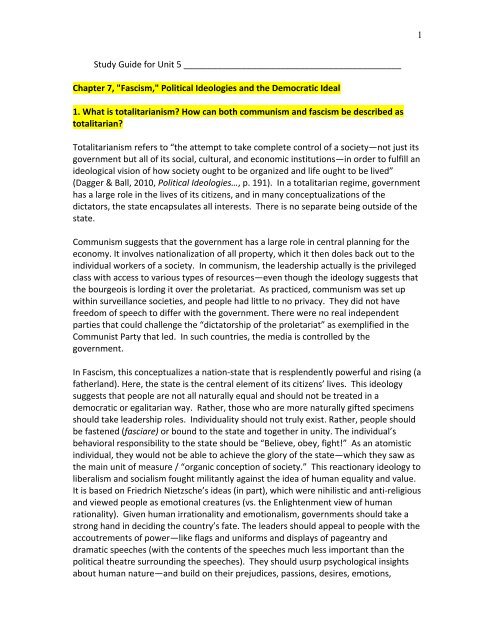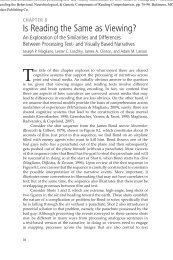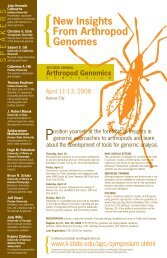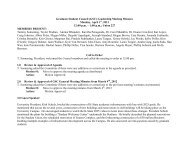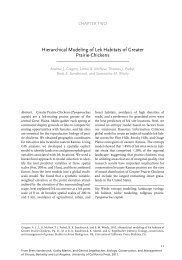Chapter 7, "Fascism," Political Ideologies and - Kansas State ...
Chapter 7, "Fascism," Political Ideologies and - Kansas State ...
Chapter 7, "Fascism," Political Ideologies and - Kansas State ...
You also want an ePaper? Increase the reach of your titles
YUMPU automatically turns print PDFs into web optimized ePapers that Google loves.
1<br />
Study Guide for Unit 5 _____________________________________________<br />
<strong>Chapter</strong> 7, "<strong>Fascism</strong>," <strong>Political</strong> <strong>Ideologies</strong> <strong>and</strong> the Democratic Ideal<br />
1. What is totalitarianism? How can both communism <strong>and</strong> fascism be described as<br />
totalitarian?<br />
Totalitarianism refers to “the attempt to take complete control of a society—not just its<br />
government but all of its social, cultural, <strong>and</strong> economic institutions—in order to fulfill an<br />
ideological vision of how society ought to be organized <strong>and</strong> life ought to be lived”<br />
(Dagger & Ball, 2010, <strong>Political</strong> <strong>Ideologies</strong>…, p. 191). In a totalitarian regime, government<br />
has a large role in the lives of its citizens, <strong>and</strong> in many conceptualizations of the<br />
dictators, the state encapsulates all interests. There is no separate being outside of the<br />
state.<br />
Communism suggests that the government has a large role in central planning for the<br />
economy. It involves nationalization of all property, which it then doles back out to the<br />
individual workers of a society. In communism, the leadership actually is the privileged<br />
class with access to various types of resources—even though the ideology suggests that<br />
the bourgeois is lording it over the proletariat. As practiced, communism was set up<br />
within surveillance societies, <strong>and</strong> people had little to no privacy. They did not have<br />
freedom of speech to differ with the government. There were no real independent<br />
parties that could challenge the “dictatorship of the proletariat” as exemplified in the<br />
Communist Party that led. In such countries, the media is controlled by the<br />
government.<br />
In <strong>Fascism</strong>, this conceptualizes a nation‐state that is resplendently powerful <strong>and</strong> rising (a<br />
fatherl<strong>and</strong>). Here, the state is the central element of its citizens’ lives. This ideology<br />
suggests that people are not all naturally equal <strong>and</strong> should not be treated in a<br />
democratic or egalitarian way. Rather, those who are more naturally gifted specimens<br />
should take leadership roles. Individuality should not truly exist. Rather, people should<br />
be fastened (fasciare) or bound to the state <strong>and</strong> together in unity. The individual’s<br />
behavioral responsibility to the state should be “Believe, obey, fight!” As an atomistic<br />
individual, they would not be able to achieve the glory of the state—which they saw as<br />
the main unit of measure / “organic conception of society.” This reactionary ideology to<br />
liberalism <strong>and</strong> socialism fought militantly against the idea of human equality <strong>and</strong> value.<br />
It is based on Friedrich Nietzsche’s ideas (in part), which were nihilistic <strong>and</strong> anti‐religious<br />
<strong>and</strong> viewed people as emotional creatures (vs. the Enlightenment view of human<br />
rationality). Given human irrationality <strong>and</strong> emotionalism, governments should take a<br />
strong h<strong>and</strong> in deciding the country’s fate. The leaders should appeal to people with the<br />
accoutrements of power—like flags <strong>and</strong> uniforms <strong>and</strong> displays of pageantry <strong>and</strong><br />
dramatic speeches (with the contents of the speeches much less important than the<br />
political theatre surrounding the speeches). They should usurp psychological insights<br />
about human nature—<strong>and</strong> build on their prejudices, passions, desires, emotions,
2<br />
superstitions, <strong>and</strong> religious ideas. Per the video we watched in class about Benito<br />
Mussolini (1883 – 1945), he very much built his persona of being a healthy <strong>and</strong><br />
hardworking man with his propag<strong>and</strong>a, <strong>and</strong> he worked hard on outside appearances<br />
<strong>and</strong> not truly building the reality (particularly in terms of the Italian military). To the<br />
Fascist, freedom <strong>and</strong> glory are achieved by building the nation <strong>and</strong> fighting individualism<br />
<strong>and</strong> egalitarianism <strong>and</strong> racial impurities (at least for some).<br />
2. What “fascist”‐type elements existed in Counter‐Enlightenment thought?<br />
The main Enlightenment assertions in the 1700s were some of the following ideas:<br />
• Humanism – as a source <strong>and</strong> measure of value for every individual<br />
• Rationalism—humans as rational <strong>and</strong> susceptible to reason<br />
• Secularism—religion as a source of comfort<br />
• Progressivism—the human story as progress<br />
• Universalism—universal human nature despite differences of “race, culture, or<br />
religious creed” (Dagger & Ball, 2010, <strong>Political</strong> <strong>Ideologies</strong>…, p. 193).<br />
In response to the Enlightenment ideas, the Counter‐Enlightenment suggested that<br />
humans are fundamentally different <strong>and</strong> shaped by various features—whether race or<br />
gender. The human power of reasoning was too weak to be relied on. Rather, humans<br />
were prone to emotional tendencies. Many Counter‐Enlightenment thinkers found<br />
Enlightenment thinking to be “fanciful, false, <strong>and</strong> politically dangerous” (Dagger & Ball,<br />
2010, <strong>Political</strong> <strong>Ideologies</strong>…, p. 193).<br />
The Fascist type elements in Counter‐Enlightenment thought related to how people live<br />
<strong>and</strong> make decisions. The Fascist thinkers pushed for a powerful fatherl<strong>and</strong> sort of<br />
country <strong>and</strong> leadership because of their sense that the masses desired this strong h<strong>and</strong>.<br />
They appealed to the emotional natures of people through pageantry <strong>and</strong> symbolism.<br />
They appealed to the superstitious <strong>and</strong> prejudicial parts of humanity by scapegoating<br />
others (Dagger & Ball, 2010, <strong>Political</strong> <strong>Ideologies</strong>…, p. 191).<br />
3. What is "irrationalism," <strong>and</strong> how did fascists use it?<br />
In the 1800s, there were two main trends in intellectual currents: elitism <strong>and</strong><br />
irrationalism. The first suggested that a classless society was not possible, <strong>and</strong> that<br />
there are übermensches or supermen. Irrationalism proposes the idea that emotion <strong>and</strong><br />
desire affect people’s actions much more than Enlightenment believers would admit.<br />
People are seen to be at the subconscious control of various impulses about which they<br />
may not even be aware. In our Apr. 12 lecture in class, Dr. Johnson covered some<br />
thinking by various psychologists of the day who explored the human psyche. Sigmund<br />
Freud described the power of the libido in human identity <strong>and</strong> how sexual repression<br />
could lead to psychosis <strong>and</strong> hysteria. People would need to be professionally regressed<br />
in order to underst<strong>and</strong> the factors in their childhoods that drive their thinking / feeling<br />
<strong>and</strong> behaviors as adults. B.F. Adler suggested that people’s underlying motivations are
3<br />
to achieve a feeling of superiority over others. Early childhood experiences may result<br />
in feelings of inferiority, <strong>and</strong> so they assert themselves in order to get over these<br />
feelings. Carl Jung posited a collective unconscious as a species that could be passed on<br />
from one generation to the next. There are seminal archetypes of identities—through<br />
parenting, war, survival, hunger—<strong>and</strong> these are buried in the individual psyche at birth.<br />
These are embedded images <strong>and</strong> influential on people but difficult to be articulated.<br />
(Dr. Johnson mentioned that these may well be Platonic sorts of ideas.) There is the<br />
self. The “shadow” refers to animal instincts. Men have “anima” which is their feminine<br />
side <strong>and</strong> allows them to relate to women; women have an “animus” which is their<br />
masculine side <strong>and</strong> allows them to relate to men. People all have personas or their<br />
masks to the world. Some identities that are expressed as character types are hero<br />
figures, tricksters (like the devil), mothers, <strong>and</strong> other recurring figures. With the<br />
modern age focused on science <strong>and</strong> not on folklore / magic / religion, this human need<br />
may be met in modern mass movements or “mass mind” endeavors. Jung warned<br />
people of how such foundational needs may be met through political movements.<br />
Gustave Le Bon made observations about mass behavior <strong>and</strong> how people act differently<br />
when they are part of large groups than individually. For many, their courage is<br />
bolstered by being part of a large group: the more people there are, the more right you<br />
must be. In large groups, there are instigators or those who influence the group. The<br />
Fascists tapped this inherent need for symbolism by using flags, symbols, gestures,<br />
uniforms, speechifying, <strong>and</strong> other methods. (Dr. Johnson asked how so many could<br />
have fallen for dictators <strong>and</strong> their regimes—in what otherwise would have been<br />
ordinary people.)<br />
So irrationalism refers to the unthinking / non‐thinking <strong>and</strong> subconscious parts of<br />
human nature that drive them. This also refers to people’s emotions <strong>and</strong> need for<br />
superstitions. People have a need to believe. The Fascists tapped into this through<br />
pageantry, speech‐making, uniforms, parades, uniforms, symbols, gestures, flags, <strong>and</strong><br />
other accoutrement to support their power. When they activated movements, they<br />
activated people en masse because people would be willing to do more as a large group<br />
than as individuals. People were moved by myths, so they engaged in myth‐making.<br />
They manipulated people emotionally. They strove to stir them with music <strong>and</strong> other<br />
engagements. (In light of today’s “predictive analytics,” it’s pretty concerning how<br />
predictable people can be.) Their military adventurism could be seen as a ploy for<br />
power (<strong>and</strong> was), but it was also a way to rally people around an intense <strong>and</strong> emotional<br />
cause.<br />
4. How did Hitler <strong>and</strong> Mussolini deal differently with race?<br />
Adolf Hitler venerated Aryans for their superiority <strong>and</strong> ability to create culture. He set<br />
up the common German Volk or people as a cultured <strong>and</strong> high‐minded people. He saw<br />
others as inferior peoples, whose lesser‐ness would allow them to be taken over. He<br />
scapegoated the Jewish people by suggesting that they were l<strong>and</strong>‐less <strong>and</strong> culture‐less<br />
<strong>and</strong> non‐creative parasites that lived off the l<strong>and</strong>s <strong>and</strong> creativity of other peoples. He
4<br />
suggested that their liberal ideas of overcoming human nature <strong>and</strong> living peaceably with<br />
others went against actual nature <strong>and</strong> showed their weakness as a people. He blamed<br />
the Jews for enervating Germany. He lumped them together with the communists.<br />
In Hitler’s Mein Kampf (“my struggle”), which he wrote while in prison in 1924, he<br />
described each race as having its own nature. Those of the Orient were crafty, cunning,<br />
<strong>and</strong> sly. Those Black Africans were stupid <strong>and</strong> slavish. Jews were greedy, scheming,<br />
selfish, <strong>and</strong> corrupting. The Aryans, however, were the master race, noble, creative,<br />
cultured, <strong>and</strong> naturally dominant. Hitler’s was an ideology of Social Darwinism writ<br />
large, which explained for him a kind of race as destiny. Only an intense nationalism<br />
would save the German Aryans—<strong>and</strong> the Aryans were the only race worth living. For<br />
Hitler, freedom was the freedom of the nation or the Volk. (His ideas built on the race<br />
theorist work of Joseph‐Arthur de Gobineau, Houston Stewart Chamberlain <strong>and</strong> Ludwig<br />
Woltmann.) Many of the thinkers pointed to racial purity <strong>and</strong> pure bloodlines as the<br />
highest form of humanity. In a sense, Hitler saw the different races as almost different<br />
species.<br />
The dictator Hitler applied his ideas of gender also to the masses, whom he compared to<br />
women. He suggested that groups make decisions not by abstract reason but by an<br />
“indefinable emotional longing,” <strong>and</strong> this longing for women <strong>and</strong> for the masses was to<br />
be dominated. People respond to force <strong>and</strong> power, in the way that people find<br />
comm<strong>and</strong>ers more appealing than weaklings, he suggested. People tend to love \<strong>and</strong><br />
identify with strength. He saw the ties between the masses <strong>and</strong> their leader as erotic<br />
<strong>and</strong> sadistic, per his leadership principle or Fuhrerprinzip.<br />
In terms of the inferior peoples of the world, they were there to have their resources<br />
taken over to feed the fatherl<strong>and</strong>’s development. So, Germany invaded Pol<strong>and</strong> <strong>and</strong> the<br />
Soviet Ukraine, in their aim to gather resources to show the predominance of Germans<br />
<strong>and</strong> to eliminate all enemies. Hitler let loose the “Final Solution” to the so‐called Jewish<br />
problem, which resulted ultimately in the deaths of six million Jews, Slavs, Gypsies, <strong>and</strong><br />
others.<br />
Racial theory was at the core of Nazism (national socialism), with the following formula:<br />
<strong>Fascism</strong> + Racism = Nazism (Dagger & Ball, 2010, <strong>Political</strong> <strong>Ideologies</strong>…, p. 206).<br />
As a theory, <strong>Fascism</strong> <strong>and</strong> Nazism focused on national <strong>and</strong> ethnic identity, in a form of<br />
particularism.<br />
The fact of Hitler’s election into the leadership of Germany (as chancellor) showed the<br />
popular appeal of his ideas, in terms of the followership. He thought that Nazism—as<br />
social democracy—if combined with ruthless brutality, would overcome socialism.<br />
People tend to respond to dogma <strong>and</strong> force, Hitler suggested. Dr. Johnson said that in a<br />
time with few answers, a leader who suggested that he provided the answers <strong>and</strong> who
5<br />
appealed to existing prejudices, could make great headway, the way Hitler did. His faux<br />
sense of history with the then-modern Germans linked to Aryans linked to the ancient<br />
Greeks is surprising in the sense that his storytelling could wreak so much disaster. And<br />
then again, where were the honest historians?<br />
In class on Apr. 19, we saw some of the cartoons that were prevalent in German<br />
newspapers that show Jews as dominating the world economically. There were depictions<br />
of Jewish men trying to defile Aryan women (sexual competition). We heard of the<br />
forged document of the protocols of the wise men of Zion that alleged that the Jews<br />
wanted to take over the world. The message here was of severe “othering” which made<br />
the Final Solution operational in terms of dealing with these non-assimilable scheming<br />
beings. Those ideas also justified the killing <strong>and</strong> enslavement (as “helpers”) of the lesser<br />
peoples to feed the German fatherl<strong>and</strong>.<br />
The philosophies of Friedrich Nietzsche were used by the Fascists. Nietzche (1844 –<br />
1900) was a nationalist. He believed in the irrationalism of people. And he was an<br />
elitist. The influence of foreigners on Germany was seen as negative. Culture gives<br />
people life <strong>and</strong> meaning, <strong>and</strong> cosmopolitanism would draw away from that. Humans<br />
are naturally classist, <strong>and</strong> believing in egalitarianism <strong>and</strong> democracy would suppress the<br />
rising of the Über mensch. Nietzche advocated elitist power. This thinker condemned<br />
democracy. Giving an equal share of power to all would overwhelm those who would<br />
naturally rule. At an extreme, democracy could emasculate the nation <strong>and</strong> hold it back<br />
from achieving great thing. He was not for charity or religions—because he felt that the<br />
masses’ will to power would overwhelm the few. He also saw European culture as too<br />
rationalistic <strong>and</strong> emphasizing reason above the “veils of culture.” People need to be led<br />
by emotion. Between Apollonian <strong>and</strong> Dionysian thought, he preferred the Dionysian.<br />
He was a nihilist <strong>and</strong> saw no meaning to life <strong>and</strong> said famously that God is dead.<br />
Like Hitler, Benito Mussolini started out as a Marxist. He had thought that class issues<br />
would be the main identity that people would go to if put under pressure, but he found<br />
that in WWI that they tended to fall back along class, race, <strong>and</strong> national lines. They did<br />
not coalesce around worldwide communism. Once he realized that nationalism was a<br />
stronger force, he went in that direction. Then he adopted <strong>Fascism</strong> as a more powerful<br />
ideology. At the core of his ideas were not about race per se but the supremacy of<br />
individuals with passion <strong>and</strong> who could use force.<br />
Benito Mussolini <strong>and</strong> the Italian Fascists, on the other h<strong>and</strong>, did not focus so much on<br />
race. Per the course discussion on April 17, he was anti‐liberal, not conservative, antisocialist<br />
(as he saw socialism as effeminate <strong>and</strong> materialistic vs. spiritualistic). His<br />
<strong>Fascism</strong> focused on the spiritual fulfillment of men who lived not for themselves but for<br />
their nation, in a selfless <strong>and</strong> non‐materialistic way. He saw it as a high calling when<br />
men subsumed themselves into the national cause <strong>and</strong> the “religious politics” of the<br />
Fascist regime. He suggests that people may recognize the Objective Will of the state in<br />
a kind of spiritual society. Maybe he thought ideas could save the people. While that
6<br />
Italian <strong>Fascism</strong> made some sort of compact with the Italian Roman Catholic church,<br />
<strong>Fascism</strong> was all about war <strong>and</strong> conflict. The politics of <strong>Fascism</strong> promoted an ethic, not a<br />
theology. (I personally think that dictators don’t mind large groups that that be cowed<br />
at a few pressure points—namely—at the level of the leaders. Large churches can be<br />
hugely compliant… ) Anyway, Mussolini was good at creating staged sets <strong>and</strong> headline<br />
events but not so effective at rallying the economy or the military. He seemed to buy<br />
into what he saw as the human desire for wild action <strong>and</strong> the appeal to emotions. He<br />
fed the love of violence as well.<br />
Mussolini saw war as a spiritual force that brought into full play people’s will <strong>and</strong><br />
intelligence. He did not see perpetual peace as possible (in contrast to the Kantian<br />
sense of hope). He saw war as the highest tension of all human capabilities. Finally,<br />
Italian <strong>Fascism</strong> controlled the economy into “corporations” or collections of economic<br />
sectors under state control. People were to stop making money for themselves but<br />
work for higher <strong>and</strong> collective nationalistic goals. Mussolini realized that people could<br />
capitulate quickly in the face of violence, such as the president Victor Emmanual III<br />
when faced with the Fascist Blackshirts, when he capitulated to Mussolini’s power <strong>and</strong><br />
made him prime minister. Mussolini’s sense that people were pushovers was accurate<br />
only to a degree. It did not work as a long‐term strategy.<br />
The Italian Fascists did not agree with the positivistic conceptualists of life of<br />
liberalism—which suggested that with the proper laws that people could live a better<br />
life through their government. They saw the push to institute laws as signs of weakness<br />
with weak peoples using laws to balance out power. n their critique of the<br />
Enlightenment view, they saw race as inherently more instructive about how people<br />
would live. They also saw the power of terror in driving power in the world. If history<br />
was a vast slaughter <strong>and</strong> acts of war, then sometimes, it must be necessary to be willing<br />
to die in order to feel human. Warfare was drama <strong>and</strong> a time when people were at their<br />
most human. The human competition to dominate per the Hegelian view was a core<br />
part of the Italian Fascist ideology. As Dr. Johnson said, Benito Mussolini portrayed<br />
himself as a “manly man” who bore the inherent challenge of pushing other men to also<br />
act in hyper‐masculine ways. His sense was that outside of history, man is nothing.<br />
Mussolini was more of a doer <strong>and</strong> less of a thinker. He worked to concentrate power<br />
(conservatives would have been skeptical of deep concentrations of power). He<br />
encouraged his own cult of personality.<br />
Anyway, racialized ideas in the 20 th century did lead to other manifestations in other<br />
geographical zones—such as apartheid in S. Africa.<br />
READINGS FROM IDEALS AND IDEOLOGIES: A READER<br />
1. What did Joseph‐Arthur De Gobineau (1816‐1882) dislike about Enlightenment<br />
thought?
7<br />
Enlightenment thought suggested that humans tend to be universally rationalistic. By<br />
contrast, De Gobineau suggests that there are huge racial differences between those of<br />
different races <strong>and</strong> that the white race is far superior to the “yellow” <strong>and</strong> “black” races.<br />
He describes history as being created by one family alone, that of the strong white race.<br />
(So De Gobineau is not only racist <strong>and</strong> elitist, but he does not see inherent rationality in<br />
people.)<br />
2. What did Gobineau think was the way to get the optimal racial qualities?<br />
This French diplomat looked at a race as a so‐called “problem of history” <strong>and</strong> a partial<br />
reason for why societies rise <strong>and</strong> fall through history. He saw the mingling of different<br />
races as leading to societal downfalls. A nation degenerates <strong>and</strong> falls back from its<br />
highest point of achievement (civilization) when lesser races intermingle with higher<br />
ones. (De Gobineau, “Civilization <strong>and</strong> Race,” in 1915/1967, as quoted in Dagger & Ball,<br />
2010, Ideals <strong>and</strong> <strong>Ideologies</strong>, p. 291). Based on physiological observations (<strong>and</strong> theories<br />
of physiognomy <strong>and</strong> intelligence), this writer suggests that the white races are at the<br />
top, the yellow in the middle, <strong>and</strong> the black at the bottom. Whites are deeply attached<br />
to life. They were characterized by “beauty, intelligence, <strong>and</strong> strength” (p. 293). Those<br />
who are yellow tend toward mediocrity <strong>and</strong> not dreaming; they do not tend towards<br />
invention but rather emulating others. Those who are black have a low intellect <strong>and</strong><br />
tend to be prone to appetite <strong>and</strong> desires, overlaid with “instability <strong>and</strong> capriciousness of<br />
feeling.” Those of mixed race (with adulterated blood) result in dilution of the stronger<br />
races—even though there is some research (he says) that racial mixing can result in<br />
some stronger traits. De Gobineau seems to think that having races not mix is the<br />
optimal way to preserve quality.<br />
3. Why does Alfredo Rocco dislike liberal, democratic <strong>and</strong> socialist ideologies? What<br />
do they all have in common, according to him?<br />
Alfredo Rocco, in “The <strong>Political</strong> Theory of <strong>Fascism</strong>,” disliked some core assertions of<br />
liberal, democratic, <strong>and</strong> socialist ideologies: namely, the idea that there is inherent <strong>and</strong><br />
equal value in human lives <strong>and</strong> a flatter (or even non‐class) structure that would be<br />
socially ideal. For Rocco, he suggests that societies are not sum totals of atomistic<br />
individuals. Rather, the actual correct unit of actual action is the state, <strong>and</strong> people<br />
should then be subsumed in that state. Further, people are not all made equal. Their<br />
place in society should reflect their actual “natural intelligence,” based on Rocco’s ideas<br />
of elitism (Rocco, “The <strong>Political</strong> Theory of <strong>Fascism</strong>,” 1926, as cited in Dagger & Ball,<br />
2010, Ideals <strong>and</strong> <strong>Ideologies</strong>, p. 307).<br />
4. What is the ideal type of human being from Mussolini’s perspective, <strong>and</strong> what is the<br />
worst type?<br />
Benito Mussolini apparently evolved from thinking that the fight between the social<br />
classes was the primary force of history <strong>and</strong> politics to one in which the nation has a
8<br />
primary role. He described <strong>Fascism</strong> as a “religious conception” in which a human being<br />
sees his position in relation to “superior law”.<br />
For Mussolini, the ideal type of human being is one who is a great patriot as the man of<br />
<strong>Fascism</strong>. He describes: “The man of <strong>Fascism</strong> is an individual who is nation <strong>and</strong><br />
fatherl<strong>and</strong>, which is a moral law, binding together individuals <strong>and</strong> the generations into a<br />
tradition <strong>and</strong> a mission, suppressing the instinct for a life enclosed within the brief<br />
round of pleasure in order to restore within duty a higher life free from the limits of<br />
time <strong>and</strong> space; a life in which the individual, through the denial of himself, through the<br />
sacrifice of his own private interests, through death itself, realizes that completely<br />
spiritual existence in which his value as a man lies” (Mussolini, 1939, “The Doctrine of<br />
<strong>Fascism</strong>,” as cited in Dagger & Ball, 2010, Ideals <strong>and</strong> <strong>Ideologies</strong>, p. 296). He describes a<br />
xenophobia which informs his work—in which foreigners enervate a state…<strong>and</strong> they<br />
must be fought to avoid the enslavement of the native peoples.<br />
A worst type of individual then would be an individual who does not have relation to the<br />
<strong>State</strong> but fancies himself / herself individualistic. An individual who looks to a spiritual<br />
identity at the level of the self would be negative in Mussolini’s eyes, since he describes<br />
the state as the fulfillment of the spiritual identity of individuals. A man who does not<br />
allow his moral <strong>and</strong> intellectual life to be taken over by the state would be considered<br />
irrelevant to <strong>Fascism</strong>. A pacifist would not have a place in the militaristic Fascist <strong>and</strong><br />
totalitarian view of the world that Mussolini both espoused <strong>and</strong> lived. A Pacifist would<br />
be cowardly. Anyone who professes liberalism would also be considered the worst type<br />
because they believe in the agnosticism of politics.<br />
5. Explain what you think Mussolini means when he describes fascism as "a<br />
spiritualized conception" of man.<br />
For Mussolini, he saw the state as the ultimate embodiment of the citizens’ ambitions<br />
<strong>and</strong> their realization of their spiritual needs. He describes a self‐realization of<br />
individuals who recognize the superior law of the state <strong>and</strong> its ethics. Joining the state<br />
then “raises him to conscious membership of a spiritual society” (Mussolini, 1939, “The<br />
Doctrine of <strong>Fascism</strong>,” as cited in Dagger & Ball, 2010, Ideals <strong>and</strong> <strong>Ideologies</strong>, p. 297). He<br />
suggests a kind of transcendence <strong>and</strong> higher purpose for individuals who may be<br />
fulfilled with their citizenship in the state. This piece may be part of that conscious<br />
describing of a state to meet the subconscious needs of emotional <strong>and</strong> irrational <strong>and</strong><br />
prejudicial peoples that was discussed behind the idea of “irrationalism” (as a Counter‐<br />
Enlightenment concept that the Fascists subscribed to).<br />
6. What is the result of “racial crossing” according to Hitler?<br />
Adolf Hitler, in “Nation <strong>and</strong> Race” (from Mein Kampf or “My Struggle”), describes a<br />
journey of self‐discovery in which he found his own way back to his own people. He<br />
describes the psyche of a populace as that of a woman who wanted to be dominated.
9<br />
He observed the importance of terror, writing: “Terror at the place of employment, in<br />
the factory, in the meeting hall, <strong>and</strong> on the occasion of mass demonstrations will always<br />
be successful unless opposed by equal terror” (Hitler, 1943, “Nation <strong>and</strong> Race,” in<br />
Dagger & Ball, 2010, Ideals <strong>and</strong> <strong>Ideologies</strong>, p. 311). He suggests that it’s only natural for<br />
creatures to mate with their own kind, <strong>and</strong> any mating outside of that (by which he<br />
means mixed race) would be considered unnatural. He uses from‐nature observations<br />
to justify the promotion of “racial purity, universally valid in Nature…” (p. 311) In an<br />
evolutionary argument, he suggests that Nature desires the mating of the strong with<br />
the strong to ensure stronger species. Racial crossing might ruin generations of higher<br />
breeding (p. 312). Specifically, racial crossing is seen as leading to two issues:<br />
a. “Lowering the level of the higher race;<br />
b. Physical <strong>and</strong> intellectual regression <strong>and</strong> hence the beginning of a slowly but<br />
surely progressing sickness” (p. 312.<br />
He brings in a religious element saying that such racial crossing will be a “sin against the<br />
will of the eternal creator” (p. 312).<br />
7. Explain what Hitler meant by referring to Jews by the derogatory term “parasites.”<br />
How would this appeal to the Germans?<br />
Hitler criticizes the “modern pacifist” stance <strong>and</strong> the need to “overcome Nature” of<br />
some of the Jewish peoples of his day (p. 312). Such ideas are not only impossible, he<br />
suggests, but reflects the impoverishment of the Jewish peoples. “Certain ideas are<br />
even tied up with certain men,” he writes (p. 313). He suggests that the pacifistichuman<br />
idea will lead to “barbarism <strong>and</strong> chaos” (p. 313). Further, he sees the weakening<br />
of the strong Aryan blood as leading to the “blood poisoning” of racial mixing.<br />
In Hitler’s conceptualization, he describes culture as high human achievement <strong>and</strong> ties<br />
cultures to certain races. “If we were to divide mankind into three groups, the founders<br />
of culture, the bearers of culture, the destroyers of culture, only the Aryan could be<br />
considered as the representative of the first group,” he writes (p. 314). Tapping history,<br />
he looks to how the Aryans colonized other peoples as examples of their superiority.<br />
The Jews are seen as having their own separate culture. Their nature is one of<br />
“cunning,” according to Hitler. They are a peoples without their own l<strong>and</strong> or own<br />
culture <strong>and</strong> therefore had lesser value (p. 318). He describes them as selfish <strong>and</strong> selfinterested<br />
(p. 317). The parasitic reference suggests that a Jew is a “typical parasite, a<br />
sponger who like a noxious bacillus keeps spreading as soon as a favorable medium<br />
invites him. (Not all parasites destroy hosts. Rather, some have commensal relationships<br />
with their hosts.) And the effect of his existence is also like that of spongers wherever he<br />
appears, the host people dies out after a shorter or longer period,” he writes (p. 319).<br />
The propag<strong>and</strong>a of that age showed Jews as vampires. Hitler suggested that the Jews’<br />
intelligence was stolen from their interactions with other peoples—who on their leaving
10<br />
(expulsions)—took others’ ideas with them like thieves (in Dr. Johnson’s words). In the<br />
Apr. 19 class, Dr. Johnson showed the Jews as the “ultimate contradiction” or counternarrative<br />
to the Nazi view. After all, the Jews hailed from an ancient civilization <strong>and</strong><br />
were highly accomplished <strong>and</strong> strong <strong>and</strong> learned. Hitler even called them his<br />
“mightiest opponent.” Hitler argued that excessive civilization <strong>and</strong> intelligence was bad.<br />
He cited their lack of passion <strong>and</strong> their irrationalism. He lauded Aryans (“the chosen<br />
race”) as much greater in their willingness to put themselves into the lives of the<br />
community through self-sacrifice (vs. the Jews whom he depicted as self-interested <strong>and</strong><br />
selfish, intelligent without spirit).<br />
He uses many derogative descriptions: “If the Jews were alone in this world, they would<br />
stifle in filth <strong>and</strong> offal; they would try to get ahead of one another in hate‐filled struggle<br />
<strong>and</strong> exterminate one another, in so far as the absolute absence of all sense of selfsacrifice,<br />
expressing itself in their cowardice, did not turn battle into comedy here too”<br />
(p. 318). He ascribes to Jews socialist ideas. He points to “blood poisoning” in terms of<br />
intermixing. He points to economic <strong>and</strong> political manipulations to try to take over the<br />
host state.<br />
They were not directly contributing to the nation, <strong>and</strong> so they were weakening it. The<br />
German peoples, who were humiliated in WWII, are thought to have found vindication<br />
in Hitler’s scapegoating ideas.


